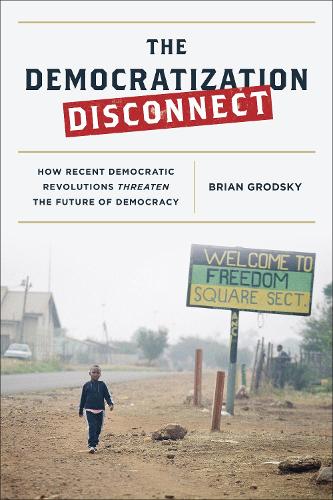
The Democratization Disconnect: How Recent Democratic Revolutions Threaten the Future of Democracy
(Hardback)
Publishing Details
The Democratization Disconnect: How Recent Democratic Revolutions Threaten the Future of Democracy
By (Author) Brian K. Grodsky
Bloomsbury Publishing PLC
Rowman & Littlefield Publishers
25th August 2016
United States
Classifications
Tertiary Education
Non Fiction
Revolutionary groups and movements
322.42
Physical Properties
Hardback
288
Width 158mm, Height 234mm, Spine 21mm
526g
Description
The most recent wave of democratic revolutions has convinced many in the West of the triumph of political rights. But in this provocative book, Brian Grodsky argues forcefully that nothing could be further from the truth. Todays revolutionariesboth democratic and non-democraticare much like those who preceded them throughout history. Theyve all come into power promising enhanced political, but especially economic, rights: higher wages, better living standards, more security. The difference between todays pro-democracy leaders and yesterdays non-democratic ones, the author demonstrates, rests on the perceived international legitimacy of the democratic template. Now, when even the most abusive regimes feel the need to label themselves democracies, opponents delegitimize rulers by calling them undemocratic. This sets the stage for what Grodsky calls the democratization disconnect. Leaders and followers fight for political change not as an end, but as the most acceptable means to attain economic rights. But by selling democracy as a panacea for the ills of the preceding regime, new elites simultaneously cheapen the notion of democracy and, by creating unrealistic popular expectations, set it up for failure. Putting a fresh new spin on hotly debated current events, this clear-eyed and informed book will be essential reading for all politically engaged readers.
Reviews
Grodsky writes in an accessible fashion. But the Democratization Disconnect seems to be born of his frustrations while serving briefly in the US embassies in Tashkent and Warsaw. Adopting a contrarian view of democratization, Grodsky derides an international community that has generated superstar status to democracy by raising unachievable expectations for universal human dignity. Like many who have seen too many democracy promotion efforts fall far short, Grodsky deploys widely varied case studies to demonstrate the absence of a worldwide success for democratic legitimation. But is the hope for human dignity truly a false internationally endorsed bill of goods offered up by savvy revolutionaries of any stripe That Grodsky has positioned himself in the democratization debate via such a provocative view is, at the very least, commendable. Acomprehensive bibliography is included. Recommended for undergraduates and graduate students in comparative and international politics. Summing Up: Recommended. Upper-division undergraduates through faculty. * CHOICE *
Challenging widespread assumptions that the most recent democratic wave was about political liberty, Grodsky expertly shows that participants in the revolutions that took place during the past two decades in Yugoslavia, Ukraine, Georgia, Kyrgyzstan, and some Arab countries fought primarily for economic rights while acting in the name of political ones. This is a compelling book recommended for all those interested in the future of democracy and democratization around the world. -- Lavinia Stan, St. Francis Xavier University
Brian Grodsky has written a thoughtful and important book about how the notion of democracy has been used by various ideological movements over time. His work reflects a strong understanding of history and raises critical questions about the future of democracy.Everyone concerned about peace and security should read this incisive analysis. -- Lincoln Mitchell, author of The Democracy Promotion Paradox
Grodsky's sweeping overview of the disappointing results of diverse democratic revolutions throughout the modern era is a sobering reminder that future social support for democratic institutions cannot be taken for granted.On the contrary, Grodsky shows clearly that when democracy fails, it is all too easy for authoritarian ideologues of various stripes to hijack unfulfilled mass demands for human dignity.At a time when the fate of global democracy is more uncertain than at any point since the end of the Cold War, The Democratization Disconnect is sure to provoke widespread and salutary debate. -- Stephen E. Hanson, William and Mary
Author Bio
Brian Grodsky, a former U.S. diplomat and journalist, is associate professor of political science at the University of Maryland, Baltimore County. His books include Social Movements and the New State and The Costs of Justice. His interests include democratization, human rights, transitional justice, global civil society, social movements, and U.S. foreign policy. He has conducted research in most of the countries covered in this book, including Russia, Poland, South Africa, Georgia, Serbia, and the United States.
